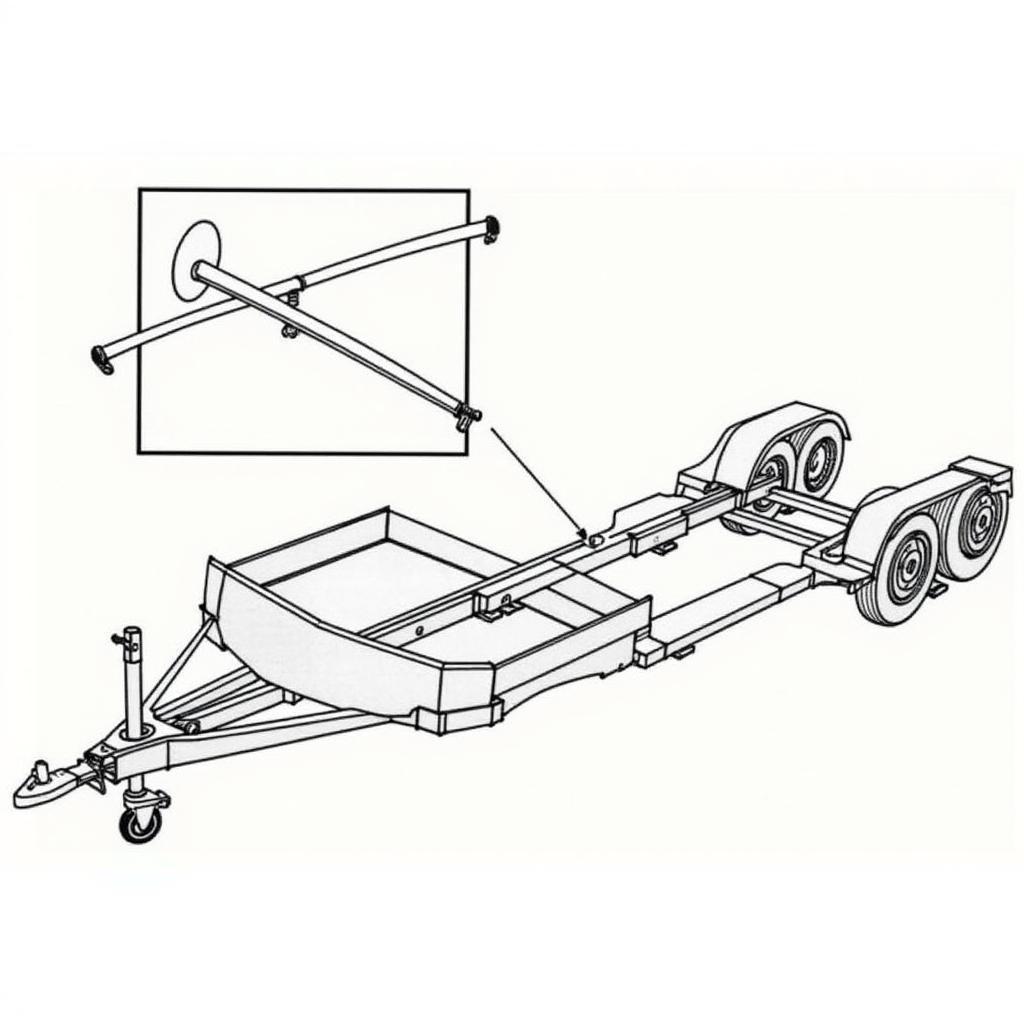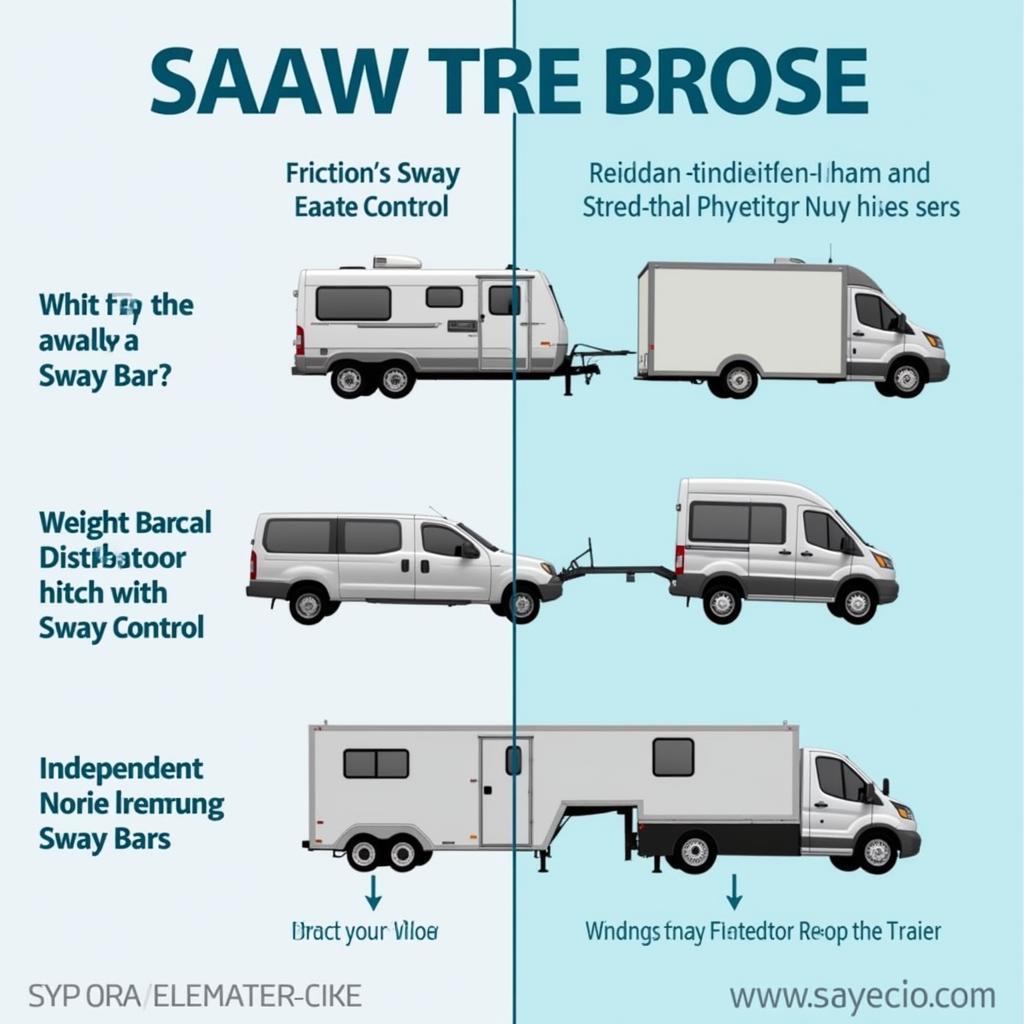When towing a horse trailer, safety should be your top priority. Your precious cargo depends on it. One crucial component that significantly contributes to a stable and secure towing experience is the horse trailer sway bar. These often-overlooked heroes play a vital role in preventing dangerous swaying and rocking motions, ensuring a smoother, safer ride for both you and your equine companion.
Understanding Horse Trailer Sway Bars
 Illustration of a Horse Trailer Sway Bar
Illustration of a Horse Trailer Sway Bar
Horse Trailer Sway Bars, also known as anti-sway bars, are essential components of your trailer’s suspension system. They are designed to control the trailer’s lateral (side-to-side) movement, which can be especially problematic when towing at higher speeds, navigating curves, or encountering windy conditions.
Imagine driving on the highway when a gust of wind suddenly hits your trailer. Without a sway bar, the trailer could begin to sway violently, potentially causing a dangerous situation for you, your horse, and other drivers on the road.
Here’s how sway bars work:
- Counteracting Forces: Sway bars function by distributing weight and counteracting the forces that cause swaying. When the trailer starts to sway to one side, the sway bar transfers some of the weight to the opposite side, helping to level the trailer and reduce the severity of the sway.
- Enhanced Stability: By minimizing sway, these bars significantly improve the stability and handling of your trailer. This enhanced stability translates to a smoother, more controlled ride for your horse, reducing stress and potential injury.
Types of Horse Trailer Sway Bars
 Different Types of Sway Bars for Horse Trailers
Different Types of Sway Bars for Horse Trailers
Several types of sway bars are available, each with its own advantages:
- Friction Sway Control: These are the most basic type, using friction to resist sway. They are relatively inexpensive but can be less effective than other options, especially for heavier trailers.
- Weight Distribution Hitch with Sway Control: This type combines a weight distribution hitch with a built-in sway control mechanism. It helps to level the trailer and provides more effective sway control than friction bars.
- Independent Suspension Sway Bars: Trailers with independent suspension systems often have dedicated sway bars integrated into the suspension design. These offer superior sway control and contribute to a smoother, more comfortable ride for your horse.
Choosing the right sway bar depends on factors like the weight of your trailer, your typical driving conditions, and your budget.
“I always recommend investing in a quality sway bar that’s appropriate for your trailer and driving habits,” advises veteran horse owner and trailer expert, John Riley. “It’s a relatively small investment that can make a world of difference in terms of safety and peace of mind.”
Benefits of Using Horse Trailer Sway Bars
The advantages of using sway bars extend beyond just safety:
- Increased Safety: Sway bars are essential for preventing trailer sway, which can lead to loss of control and accidents.
- Improved Handling: They enhance the stability and handling of your trailer, making it easier to tow, especially in challenging conditions.
- Reduced Horse Stress: A smoother ride with less swaying means less stress and anxiety for your horse during transport.
- Protection for Your Vehicle: Sway bars can help to protect your tow vehicle from excessive wear and tear by reducing the strain caused by trailer sway.
- Enhanced Confidence: Knowing that your trailer is equipped with an effective sway bar provides peace of mind and allows you to focus on driving.
Choosing and Installing Horse Trailer Sway Bars
Selecting the right sway bar and ensuring proper installation is crucial for maximizing its effectiveness.
Choosing the Right Sway Bar:
- Trailer Weight: Consider the weight of your fully loaded trailer. Sway bars are designed to handle specific weight ranges.
- Driving Conditions: Think about your typical driving routes and conditions. If you frequently encounter strong winds or hilly terrain, you’ll need a more robust sway bar.
- Hitch Type: Make sure the sway bar is compatible with your trailer hitch.
Installation:
- Professional Installation: For optimal safety and performance, it’s generally recommended to have your sway bar professionally installed.
- Follow Instructions: If you choose to install the sway bar yourself, carefully follow the manufacturer’s instructions. Improper installation can render the sway bar ineffective and potentially dangerous.
Maintaining Your Horse Trailer Sway Bars
Regular inspection and maintenance of your sway bars will ensure their longevity and effectiveness.
- Visual Inspection: Regularly check your sway bars for any signs of wear and tear, such as cracks, bends, or loose components.
- Lubrication: Lubricate the moving parts of the sway bar according to the manufacturer’s recommendations.
- Professional Check-ups: Have your sway bars inspected by a qualified trailer mechanic during your annual trailer maintenance.
FAQs About Horse Trailer Sway Bars
1. Do I need a sway bar if my trailer is small and lightweight?
Even small trailers can benefit from sway bars, especially when carrying a live load like a horse. It’s best to err on the side of caution and invest in a sway bar for added safety.
2. Can I install a sway bar on my own?
While it’s possible to install a sway bar yourself, it’s generally recommended to have it done by a professional to ensure correct installation and optimal performance.
3. How often should I replace my sway bar?
With proper maintenance, sway bars can last for many years. However, it’s essential to inspect them regularly and replace them immediately if you notice any signs of damage.
Conclusion
Investing in a quality horse trailer sway bar is a crucial step in ensuring the safety and well-being of your equine partner during transport. By minimizing sway and enhancing stability, these bars provide a smoother, more comfortable ride for your horse and give you peace of mind knowing that you’re towing safely. When it comes to the safety of your equine companion, never compromise.
Need help choosing the right sway bar or have questions about trailer safety? Contact Justus Horses USA at 0772127271 or email us at [email protected]. Our team of experts is available 24/7 to assist you. You can also visit our location at QGM2+WX2, Vị Trung, Vị Thuỷ, Hậu Giang, Việt Nam. We’re always here to help you and your horse travel safely and comfortably.